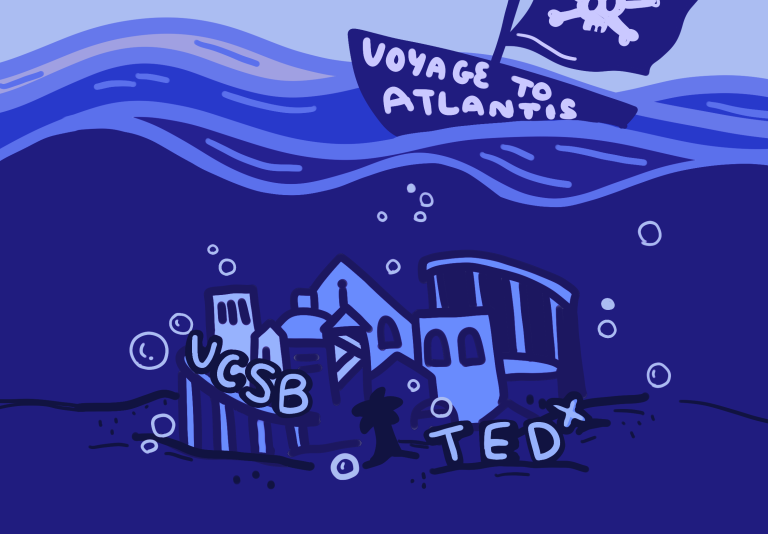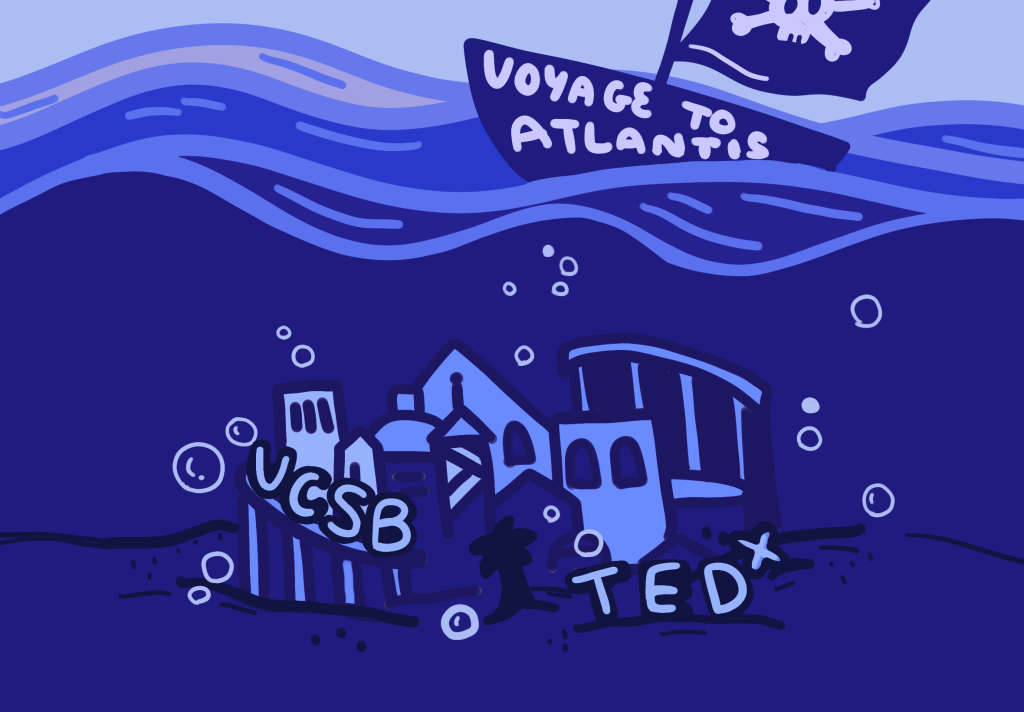
Cassie Pataky and Tia Trinh
Features Co-Editor and Arts and Entertainment Co-Editor
On Apr. 16, TEDxUCSB held its annual conference in Campbell Hall. This year’s theme, “Voyage to Atlantis,” emulated the fluidity and possibilities of water with its wide range of topics. Of the speakers, there were several professionals from the Santa Barbara community and six student speakers from UC Santa Barbara (UCSB).
The first student speaker was Kendall Martin, a javelin thrower for the UCSB Track and Field team. She spoke about how many athletes tie their identity to their sport. When athletes get injured, they may experience a mental crisis due to their reliance on athletics for validation, community, and identification. Martin argued, along with coaches becoming more sympathetic to injured athletes, schools should provide counselors in addition to a physical therapist to help injured athletes achieve a healthier athletics-life balance.

Jeffrey Mun, a computer science major at UCSB, spoke about the power of simplicity. He applied it mainly to his experience with programming, stating that creating simple algorithms makes it easier to fix bugs and solve problems. However, Mun also brought his argument to a broader scope by claiming that simplicity invites the most potential: people can easily build off of, or add onto, basic foundations. While it is easy to see how this relates to programming or coding, the ideas behind Mun’s speech are relevant and important to all facets of life. Just as he reiterated, “Keep it simple.”
Though not a student, UCSB professor Dr. Tania Israel took the stage next. She discussed how to speak with someone you don’t agree with. She particularly emphasized this in relation to political beliefs, but she engagingly used an anecdote from her life about halibut fajitas to illustrate her point. Israel brought her audience through a couple of psychological terms, explaining how each led to confirmation bias and a sense of moral superiority over the other side. Israel argued that intellectual humility, the ability to consider other perspectives besides one’s own, is cultivated by curiosity, calmness, respect, storytelling (and listening), and gratitude.
The third student speaker Amy Fullerton pitched how a journaling project can change one’s outlook on life. Fullerton explained that, in order to distinguish the days, she started an objective journal during quarantine where she recorded what she did, what she ate, and who she spent time with. Fullerton argued that by participating in this recording process, one can escape the monotonous repetition that each day brings by instead breaking routine. Fullerton claimed that her journaling habit inspired her to try one new thing each day, whether it is a new food, new activity, or meeting a new person.
Faith Talamantez used the example of the word “ghetto” to discuss the power of language to influence how we view the world. Talamantez used her “ghetto” high school Bonita Vista as an example. By labeling schools or neighborhoods as “ghetto,” Talamantez argued, we create a perception that they are disadvantaged, which only leads to less funding and a self-fulfilling prophecy. Talamantez encouraged her audience to change their vocabulary, as the language we use can affect our reality.
Andy Barrera Rios, a fourth-year Chicano studies and psychology double major drew in a large crowd of supporters. The fifth student speaker, Rios’s eccentric talk discussed the concept of “machismo” and how we can work to deconstruct narratives of patriarchy. He made connections to his own experiences and went on to encourage others to reflect upon themselves in order to build a healthier lifestyle.
Despite her initial stage fright from her interview with TEDxUCSB on their Instagram, Taylie Staten took the stage to discuss connections between neuropsychiatric health and nutrition. A psychological and brain studies major at UCSB, she tied in her own studies and journey on campus to promote healthier lifestyles for students and community members alike. She is open about her own experiences and encourages students to be confident and comfortable in their own college journey.
The last student speaker was Madison Connaughton, a fourth year Renaissance literature major with a minor in history of art and architecture. Connaughton emphasized the importance of history and argued that it is so deeply interwoven with the present that it becomes crucial for us to consider the connections. She asks us to consider items as simple as deodorant (from the Renaissance period to today) and question it in historical contexts as to why we consider it fundamentally different, when they are, in essence, the same thing.
The event as a whole was an intellectually stimulating way to spend a Sunday. The professional speakers offered nuanced and interesting talks to further promote discussion and reflection within our own lives. This year, TEDxUCSB chose to feature more students so as to shed a spotlight on the interesting research and studies that students are partaking in every day. Despite the long-run time and occasional playing of past TED talks, the student speeches themselves were more than interesting and brought students closer to their own peers who can now proudly say, “Thank you for coming to my TED talk.”











Those were not all the students from UCSB who gave a talk in this event
Comments are closed.